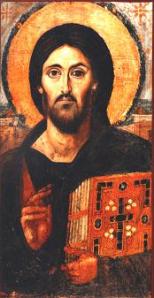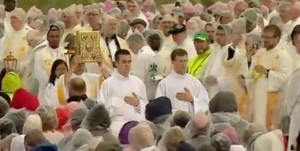How could anyone attend and participate in this liturgy of the Easter Vigil and not be moved? Not sense some excitement? Not feel the warmth and the joy of this great liturgy, when we celebrate that point in human history when Jesus rose from the dead, defeating death and sin and opening the gates of eternal life with God to each and every man, woman and child on the face of the earth. This is the day that all of creation was waiting for; when in the fullness of time, through the power of the Risen Christ we become what we were meant to be from the beginning; reunited with God for all eternity.
Our Opening Proclamation, the Exsultet, repeatedly calls all of creation to Exult-Rejoice-‘let this building shake with joy”!
There are wondrous moments in life where we have all felt a tremendous sense of joy; and yet, each of these is only a small taste of what God holds out for each of us.
Joy is irrepressible; it can’t be contained. It’s not like pleasure in an activity, or satisfaction at accomplishing something; when we experience joy, we can’t hide it – we feel compelled or drawn to let it out; to share it with everyone and anyone we come in contact with. Joy is contagious; it can even conquer fear.
Tonight we mark the most incredible cause of joy in the entire history of the human race – the Resurrection of Our Lord Jesus Christ from the dead. We celebrate and join with the members of the Church around the world, with the angels and the saints in heaven, in rejoicing at the Truth of God.
From the start of our Liturgy, with the blessing of the new fire; the lighting of the Paschal candle; the spreading of the light into the darkened church building; the incense, the music, the readings, the decorations; everything speaks of the joy in spreading this message that Christ is Risen; that everything that God spoke through the Scriptures, through the prophets; everything in the Gospels is true.
Sometimes we think the people of the past, who weren’t as technologically advanced as we are, were somehow unintelligent.
In our more recent history, I don’t think any of us would consider those who grew up without the internet to be of lesser intelligence than those who have known the ‘web’ for the better part of their lives. And long before iphones and blackberries, before television and radio, people knew and understood the realities of life and relationship; sometimes I think far better than our culture does today.
The people of first century Palestine, in Jesus day, were not stupid people. They knew the realities of human existence; of struggles and success, of conflict and peace, of work and rest, and of life and death. Their practical experience and knowledge taught them that people don’t die and then just come back.
But following that first Easter, that is exactly what the disciples of Jesus were proclaiming. Jesus had died and had risen! It was the message that spread throughout the known world, and people believed; many to the point of giving their very lives in defense of the Gospel. It was the message that through Christ, sin and death were defeated, and the promise of eternal life, being reunited with God as we were all meant to be, was given to all who believed.
Those who heard and accepted the Gospel message did so because of the witness of believers; because of the ‘light of Christ’ which was shining from them and the faith they were granted by God through the working of the Holy Spirit.
It’s interesting to note that while each of the four Gospels contains different insights into the teaching and works and actions of Jesus during his lifetime on earth, there are only a couple of episodes that are recorded in all four; they all record the passion, death and Resurrection of Jesus- and they all record how St. Mary Magdalene was the first witness to the Truth of the Resurrection; and even though she first met this truth with fear, that fear would give way to joy; she in turn would be the one to take this joyful news and share it with the Apostles; despite all of the turmoil and sorrow and horror that all of Jesus friends and followers and family experienced in the several days leading up to this, here was the message of indescribable joy that simply could not be contained.
He is Risen!
The authorities in Jerusalem could not defeat God’s plan; the power of the Roman Empire could not defeat God’s plan; today, a world and society that seems bent on self-absorption and self-destruction cannot defeat God’s plan. Even death itself could not defeat God’s plan. The light of Christ remains. The Church remains.
In some way, at some time, each of us has been called by God to return to Him; directly or indirectly – perhaps by angels as the message of Christ’s resurrection is told to St. Mary Magdalene; perhaps through others’ words and actions, as St. Mary Magdalene was instructed to tell the news of the resurrection to the other disciples; perhaps by a whisper from God Himself in the very depths of our hearts, whether we recognized it at the time or not.
But God has called each of us into this victory, this relationship of eternal life with him and when we really take the time to consider that, how could we not be filled with joy? How could we not want to share that with others through our own witness to the goodness of God in our lives or the promise of eternity with God because of Christ’s rising from the dead? How could we not want to share in the sacramental life of the Church?
The story of salvation history is not just the story of the Jewish people…it’s the story of all people…it is the story of the Church…it is the story of each one of us gathered at Mass; nowhere is that more clearly represented than in RCIA candidates; God has called each of them into relationship with Him, and they have responded. They have journeyed for months, learning about and deepening their understanding of the faith of the Roman Catholic Church, and have consciously made a decision to say ‘yes’ to accept the gift of relationship that God holds out; committing to receiving that gift from God; becoming adopted children of God; becoming sisters of God’s only Son, Jesus Christ; entering into the family of all of us gathered here. And they in turn will receive the ‘light of Christ’ through their entry into the Church, and by their own witness, will bring that light to others, sharing the Gospel – their joy – with others.
It has not been easy all the time, and the periods of study and reflection, of gatherings and dismissals has presented its own challenges for each of our candidates; but here again is a sign as a reminder for each of us; during our continuing journey in faith, each of us faces challenges and struggles; but God continually calls us and gives us the help we need to rise above those challenges and open our hearts to this great gift of Himself – His life- that He so desires to give continually to each of us.
That’s love; it’s a love which gives us hope; that is a hope that fills us with joy.
There is always time to consider the trials and tragedies and difficulties of our life on earth. There is always time to reflect on the inhumane acts perpetrated in various parts of the world by the strong over the weak. There is always time to consider the struggles the Church faces in the world; but this is not the time to reflect on those. This is a time to celebrate; this is a time for great happiness and gratitude and joy.
This is the Day that the Lord has made; Let us Rejoice and be glad!
Praised be Jesus Christ, now and forever!







